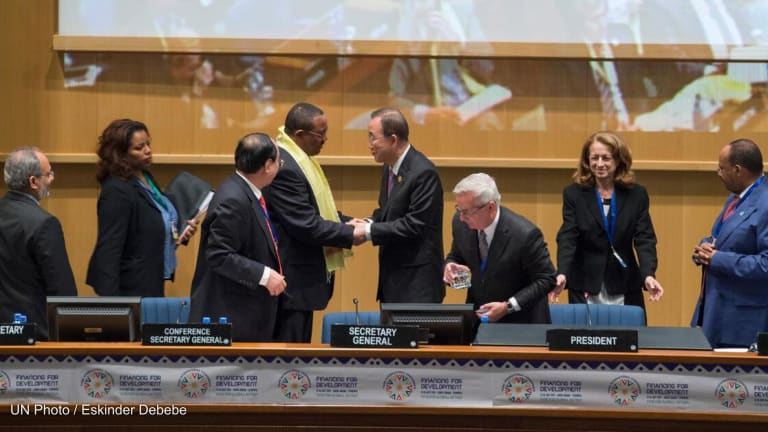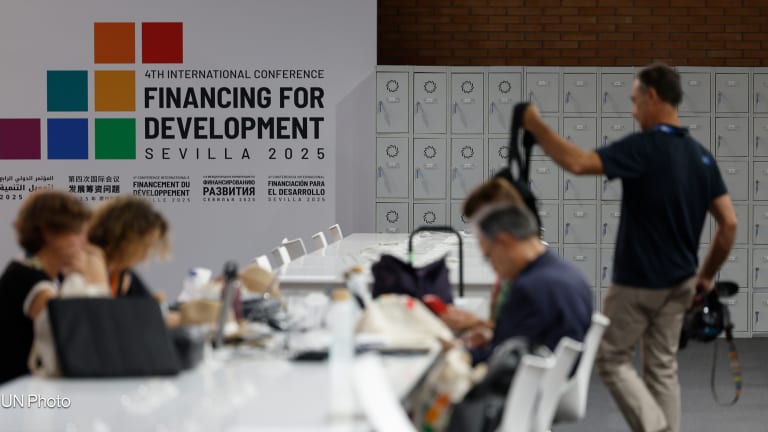
“Fine words,” the British like to say, “butter no parsnips.” Once you can figure out what those crazy Brits mean, it’s not a bad motto for the development community in 2016.
We all know that 2015 was The Year of Big Meetings. There was the financing for development conference in Addis Ababa in July, the United Nation’s Sustainable Development Summit in New York in September, and the climate change talks in Paris before Christmas. From one month to the next, the year was punctuated by the kind of occasions where officials, politicians and activists gather together as if they were characters from a Flemish painting of a medieval fair.
Big meetings matter. They force governments to make public commitments to do important things — list the world’s development priorities, find the resources to fund them, beat back the devastating impact of uncontrolled climate change. But without some discipline behind them, the commitments made at big meetings don’t mean much. It’s not promises that count — we all make those every day with about as much thought as we buy lunch. It’s whether or not they are kept.
In 2016, the key task of global civil society will be to mobilize to make sure that the promises that were made in 2015 are seen through.
Actually, let me refine that. In 2016, our key task will be to start on a 15-year journey to see those promises are kept. Because we’re not going to end extreme poverty and preventable disease or sort out climate change overnight. We’re all going to have to stick at it for years, using new campaigning techniques, modern technology, and all the tools of the data revolution to ensure that the investments designed to meet the new global goals actually reach those who most need assistance to build a better life — and particularly girls and women, because we all know that poverty is sexist and that the only way we can really tackle poverty is if we empower those whom it disadvantages.
Along this journey of activism, it’s going to be crucial to keep three principles in mind:
The first is to concentrate on the poorest — on those who most need to see progress on the global goals and on help with adapting to climate change. And here the news at the start of 2016 is not good. Recently released figures from the Organization for Economic Cooperation and Development for 2014 show that while overall aid reached record levels that year, the very poorest countries got a much reduced share. There’s good reason to think that the figures for 2015 may be even worse.
That has to change. As part of a big deal that we put on the table for the Addis Ababa conference on financing for development, ONE called — and continues to call — for donor countries to commit 50 percent of development assistance to the least developed countries. That sort of promise is going to be even more important in the future, as the last pools of extreme poverty are concentrated in fragile states and conflict or post-conflict zones.
Second, it will be vital to remember that activism and advocacy in this 15 year period cannot be solely a prerogative of the “global north,” directed by northern organizations. We’ve all seen the charts; we all know that over the next two decades the relative importance of the sources of funds for development is going to change. Traditional development assistance is going to decline in importance relative to the contribution from domestic resources in the “global south.”
In that new world, activism and advocacy is going to have to shift its focus. We are all going to have to look to the south and east for funds for development — and hence develop tools for advocacy and partnerships between organizations in the global north and global south so that governments everywhere are held to account. That will involve a real shift in terms of mindset and organizational priorities.
Third, we need to remind ourselves that ours is a great moral crusade that can resonate with tens of millions around the world. This is an amazing time for social activism, as movements like “Black Lives Matter” transform the debate on criminal justice systems, and as respect for gay rights, and for gender security and identity, embed themselves in societies around the world.
All of those campaigns have passionate, personal resonance with individuals. In the movement to end extreme poverty and preventable disease, we need to learn from such successful campaigns for social change, and to make sure that as far as possible our issues, too, have the degree of personal connectedness with supporters as others do.
We have the tools, passion and technology to get the job done. The time for fine words is over. Let’s butter some parsnips.
Join the Devex community and access more in-depth analysis, breaking news and business advice — and a host of other services — on international development, humanitarian aid and global health.




